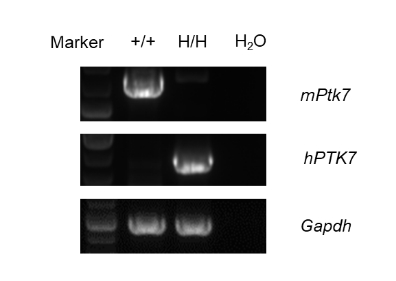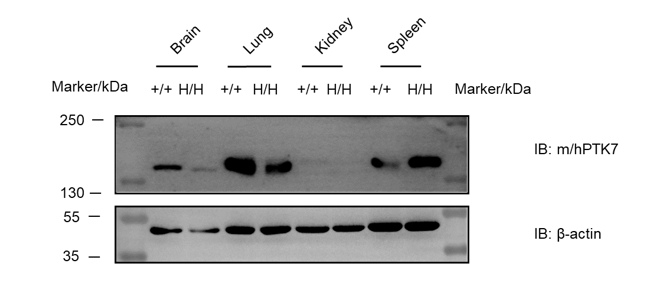


C57BL/6-Ptk7tm1(PTK7)Bcgen/Bcgen • 112192
| Product name | B-hPTK7 mice |
|---|---|
| Catalog number | 112192 |
| Strain name | C57BL/6-Ptk7tm1(PTK7)Bcgen/Bcgen |
| Strain background | C57BL/6 |
| Aliases | CCK-4, CCK4 |
Gene targeting strategy for B-hPTK7 mice. Exon 2~14 of the mouse Ptk7 gene that encodes the full-length protein was replaced by human PTK7 exon 2~14 in B-hPTK7 mice.

Strain specific analysis of PTK7 mRNA expression in wild-type C57BL/6 mice and B-hPTK7 mice by RT-PCR. Lung RNA were isolated from wild-type C57BL/6 mice (+/+) and homozygous B-hPTK7 mice (H/H), then cDNA libraries were synthesized by reverse transcription, followed by PCR with mouse or human PTK7 primers. Mouse Ptk7 mRNA was detectable only in wild-type C57BL/6 mice. Human PTK7 mRNA was detectable only in homozygous B-hPTK7 mice but not in wild-type mice.

Western blot analysis of PTK7 protein expression in homozygous B-hPTK7 mice. Various tissue lysates were collected from wild-type C57BL/6 mice (+/+) and homozygous B-hPTK7 mice (H/H), and then analyzed by western blot with anti-PTK7 antibody. 40 μg total proteins were loaded for western blotting analysis. PTK7 was detected in brain, lung and spleen from wild-type C57BL/6 mice and homozygous B-hPTK7 mice.